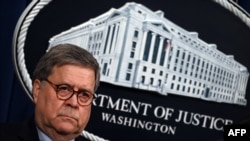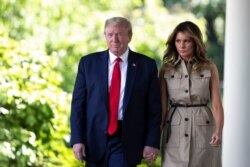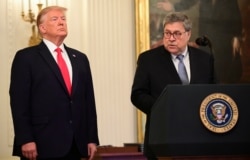As President Donald Trump encourages state governors to reopen their economies despite growing criticism of Trump’s handling of the coronavirus pandemic, U.S. Attorney General William Barr has stood loyally by his boss throughout the monthslong crisis.
Barr has praised Trump’s response to the pandemic as “statesmanlike” and blasted the press for waging a “jihad” against the anti-malaria drug hydroxychloroquine after Trump controversially touted it as a potentially “game-changing” treatment for COVID-19 based on no scientific evidence.
The attorney general, who was tapped to succeed Jeff Sessions in December 2018, has repeatedly echoed Trump’s frustration with stay-at-home orders imposed by states, likening them to “house arrest” even as Barr has acknowledged the states' right to take emergency measures during a crisis.
Barr, who first served as attorney general under the late President George H.W. Bush, once enjoyed bipartisan support. But since taking the reins of the Justice Department in early 2019, he’s faced harsh criticism from Democrats for promoting of Trump’s interests. His efforts to blunt the findings of the Robert Mueller investigation into the Trump campaign’s ties to Russia led many to deride him as the “president’s personal lawyer.”
Barr's support for Trump's efforts have not been limited to rhetoric.
After Trump last month asserted "total authority" over state governors in setting policy only to walk back the claim, Barr's Justice Department put the weight of the federal government behind a small Mississippi church that defied a ban on drive-in religious services.
And after Trump cheered anti-lockdown protesters around the country with tweets of "LIBERATE MINNESOTA," “LIBERATE MICHIGAN" and "LIBERATE VIRGINIA," Barr designated the Justice Department's top civil rights official and the top federal prosecutor for eastern Michigan "to oversee and coordinate our efforts to monitor state and local policies and, if necessary, take action to correct them."
"Many policies that would be unthinkable in regular times have become commonplace in recent weeks, and we do not want to unduly interfere with the important efforts of state and local officials to protect the public," Barr wrote in an April 27 memo. "But the Constitution is not suspended in times of crisis. We must therefore be vigilant to ensure its protections are preserved, at the same time that the public is protected.”
In the U.S. system of government, states wield "police powers" to enforce public health measures, leaving the federal government with little sway over when and how states implement social distancing measures during the pandemic.
Powerless to sue states over social distancing measures, the Justice Department has instead filed "statements of interest" on behalf of churches, as in the Mississippi case, signaling to religious freedom advocates that the administration is standing up for their rights.
"Attorney General Barr's language has been vague about what exactly the Department of Justice is indicating that it plans to do," said Lindsay Wiley, director of health law and policy program at the American University Washington College of Law. "I think it may be that that's intentionally vague because there's an effort potentially for the administration to get as much political bang for its limited legal authority buck in this situation."
In his April 27 memo to the nation's top federal prosecutors, Barr directed them to be “on the lookout for state and local directives that could be violating the constitutional rights and civil liberties of individual citizens."
In addition to religious liberty, Barr identified two other areas of concern: the free speech rights of protesters and state measures that might unduly interfere with the national economy.
So far, however, the department has focused on religious freedom cases. The Trump administration, in recent years, has made religious liberty a priority for the Justice Department, intervening on behalf of religious groups in a string of high-profile court cases.
Religious freedom advocates view Trump and Barr as new-found allies after eight years of the Obama administration during which they felt marginalized.
In a controversial speech at the University of Notre Dame last year, Barr, an observant Catholic, railed at "militant secularists" and their campaign to "destroy the traditional moral order."
David Cortman, senior counsel at Alliance Defending Freedom, a conservative Christian advocacy organization, praised Barr's championship of religious freedom during the pandemic.
“I think he has been doing a great job,” Cortman said.
ADF has filed five lawsuits on behalf of churches during the pandemic, including one brought last month on behalf of a church in Greenville, Mississippi, against Greenville's ban on drive-in church services. The Justice Department filed a statement of interest in the case, but the case became moot after the city of Greenville dropped its ban.
Last Sunday, the Justice Department filed its second such statement of interest, intervening on behalf of a Virginia church that had been criminally cited for holding a 16-person service in violation of a state ban on religious gatherings of more than 10 people.
“The Commonwealth of Virginia has offered no good reason for refusing to trust congregants who promise to use care in worship in the same way it trusts accountants, lawyers, and other workers to do the same,” Eric Dreiband, the assistant attorney general for civil rights, said in a statement.
Cortman said the Justice Department's intervention in the case and other similar cases is important.
“The federal government is looking at a broader view about what's going on throughout the entire country, whereas the state may be looking at a more narrow view,” he said.
In all, about 20 religious groups have filed lawsuits against local and state authorities, according to Cortman. As more litigation is brought, he said, the Justice Department under Barr can intervene in other ways, for example, by becoming a party to a case or participating in oral arguments.






